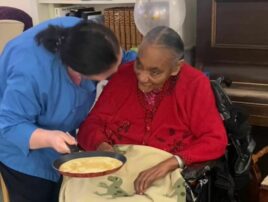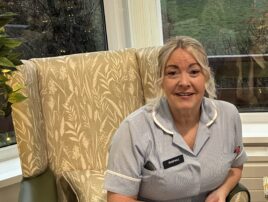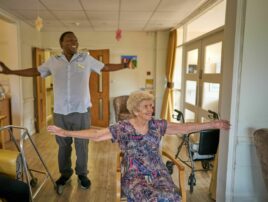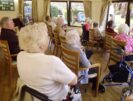Wednesday 26th July 2023
Meet a The Way We Care Lead... Jenny
Jenny first joined Evington Home, Leicester, as a carer back in 2002, before going on to do other things including working as a GCSE art teacher. In April 2022, she rejoined the team as our The Way We Care Lead. She tells us why she felt called to take on the role
I saw the need for a role like The Way We Care Lead over 20 years ago, when I first worked at Evington Home as a carer. In those days, care was much more task-oriented. The focus was on physical needs more than it was emotional and social needs. We were pushed by the clock. The approach to care is now much more holistic and person-centred.
As The Way We Care Lead, my role is all about supporting our family members’ emotional and social well-being. A lot of our family members are living with dementia. We partner with them and their families to consider how we can remove any obstacles. You can be creative in how you manage things. It’s about looking at things moment by moment and being dynamic and responsive. The small things can make a big difference.
Care can be quite fragmented so it’s important to have someone who has oversight, pulling all the information together. People journeying with dementia can’t always articulate their needs and so you have to be observant and gather feedback from across the team to paint the bigger picture.
There is a family member living with us who needed encouragement to come out of her room. When a person withdraws, the risk is they become isolated. One day someone had come in to play the piano in the lounge. I said, “Let’s go and listen together. We’ll sing your favourite hymn.” When we got down there I sang ‘How Great Thou Art’ to her. Afterwards such said, “thank you”. She may not remember that moment now, but it made a difference to her at the time and the memory of how it made her feel will live on.

As part of The Way We Care, we work closely with relatives. There is a family member, Anne, whose family asked if I could help support her interactions with staff as she would often respond to questions by saying, “I don’t know”. I’ve made a conversation book for Anne that she can look at with carers and our Hummingbirds. It has things in it like details of her life history, her likes and dislikes and some poems about Winnie-the-Pooh, as I know she really loves reading those. Now everyone has some ideas of ways to connect with her.
A lot of my role is about reassuring family members. There is another lovely family member who was a bit anxious about a photo she has of her husband. It’s in a glass frame and she kept it in her bottom drawer and wouldn’t take it out as she was worried that it might get knocked and broken. I offered to photocopy the photo so she could have it out on top of her chest of drawers. She was so incredibly grateful. She said, “Would you really do that for me?” It was like she’d won the lottery. It may seem like such a small thing but it’s made a world of difference.
Across the home, we have a culture of preference. For example, there is another lady, Margaret, who really wanted some Yardley’s lavender talcum powder. I can appreciate how evocative and comforting a scent can be, and as a child of the 80s I grew up with this kind of talcum powder and so it has a personal resonance for me, too. It isn’t that easy to come by in the shops but I managed to find some on Amazon. It’s about saying, “I’ve got time to go the extra mile.”
It’s been encouraging to see how The Way We Care approach is helping to empower all our staff in their roles. I do dementia training with all new staff as soon after they start as possible. We’ll go through things like the GEMS model by Teepa Snow and the hand-under-hand technique. One thing I’ve been working on with staff generally is communication. For people living with dementia, long sentences can be very confusing. The longer the sentence the more likely it is that they will get lost. As well as using short sentences, trigger words can be like magic. They can help you reach parts of the memory that are otherwise hidden.
We use a lot of visual cues, too. Recently, we had some new staff starting in the kitchen. I supported them to present the sandwich choices by holding up the actual sandwiches. If the person doesn’t respond when you say, “Would you like ham or cheese?” you can break it down further and just say “ham or cheese?” Again, it’s a little thing that can make a big difference.
On-going training for staff is important. When you’re a carer, constantly doing the same tasks, maybe over 50 times a week, it’s easy to get desensitised. One thing I do is remind carers that when you are doing something with a person, you have to explain it to that person as if it’s their first time as that might be their reality. For example, if you’re using a hoist saying things like, “You’re going up now”. Imagine how frightening that could be if you were experiencing something like being lifted in a hoist as though it was the first time and no-one explained it to you. There is a dignity in communication.
It’s the same with someone’s personal care. We’d all say “excuse me” if you leant across someone to grab something. How much more then should we say that to someone whose intimate space you are entering.
For me, caring for our family members is part of living out my Christian faith. When I was small, the job I wanted was to be a missionary. In my current circumstances, I don’t have the opportunity to go to Africa or somewhere else. My way of being a missionary is by working at Evington, doing ministry with God’s people during these final stages of life.
As a Christian, I love praying with our family members and reading Scripture. That’s what I’m really passionate about. If they are in pain, I will pray with them about that. Sometimes I’ll pray against the confusion of dementia. We have a God who can do anything. Being able to get alongside people is so important. Once a month, I lead devotions in the main lounge. We all need spiritual encouragement to lift us and help us find comfort and peace and joy in God. I absolutely love our family members and would do anything to help them.
Working in a care home is always busy. When I start my day I pray, “Lord, there’s so much need here. Show me the needs and help me to prioritise my time.” It can be a challenge to find balance. I love spending as much time with family members as possible. I need to remember that doing all the planning and observing and talking to staff is to help support our family members, too. Having said that, I make a conscious effort to put down my paperwork 10 minutes before the end of my shift and go and sit with people. Even a short chat can make an enormous difference to someone.
I think to do the role of The Way We Care Lead, it’s good to have a bit of life experience. I’m a parent and I think that’s some of the best training you can have to prepare you for a career in care. We all go through challenges in life. I understand the sting of loneliness. I’ve always been big on emotional intelligence but I think my experiences have helped me to empathise all the more. I never want our family members to experience that.
And of course, the benefits go both ways. Our family members love to ask about me and my life. They care for me too.

More from Pilgrims' Friend Society...

The Way We Care
Our unique approach to ensuring that older people have all that they need to flourish in their later years

Meet a Hummingbird, Sonya at Luff House
When former teacher Sonya, now 61, saw the role of Hummingbird at Luff House advertised online, she was moved to tears and couldn’t sleep until she had applied

Worshipping With Dementia
For people with dementia, simplicity is paramount. These simple daily devotions are designed for use by caregivers, dementia sufferers, families, church groups, and medical professionals.





































